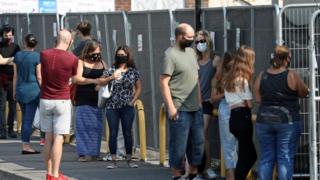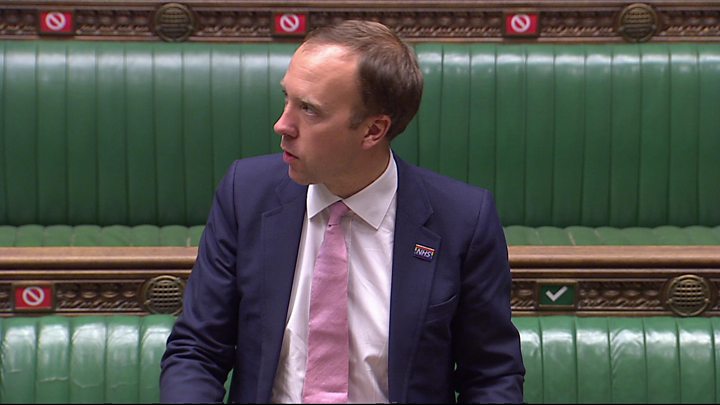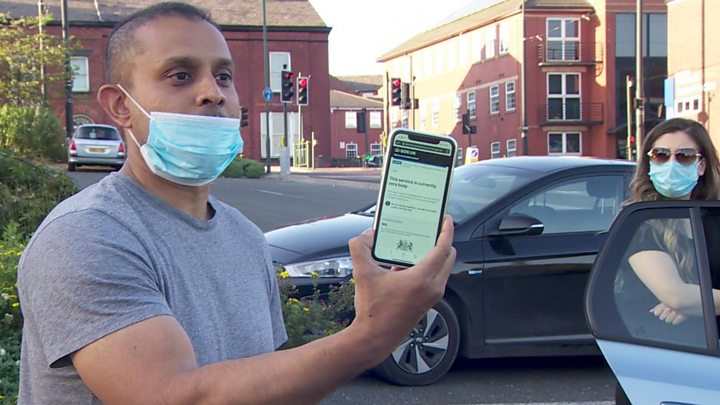 Image copyright
PA Media
Image caption
People for queue for tests at Southampton
Image copyright
PA Media
Image caption
People for queue for tests at Southampton
Boris Johnson has defended the coronavirus testing system amid ongoing reports of people struggling to get tests and results being delayed.
The prime minister told MPs there had been a "colossal spike" in demand, but the government was "working very fast" to turn around test requests.
He also said he was "concerned" about infection rates in care homes.
It comes as ministers said a list setting out who will be prioritised for tests will be published within days.
As well as prioritising tests for the NHS and then social care, schools would also be considered, Justice Secretary Robert Buckland said.
Mr Johnson said 89% of those who have in-person tests get them the next day.
He told Prime Minister's Questions on Wednesday: "I think most people looking at the record of this country in delivering tests across this nation will see that it actually compares extremely well with any other European country."
The PM had promised that all in-person test results would be back within 24 hours by the end of June.
He acknowledged the frustration around the demand for tests, but said capacity was being increased, with the government wanting 500,000 tests a day by the end of October.
Mr Johnson admitted "we are concerned about the rates of infection in care homes" and promised a new action plan for the sector would be released this week.
Labour's deputy leader, Angela Rayner, was standing in for Sir Keir Starmer at PMQs as Sir Keir was self-isolating due to a family member showing symptoms and awaiting the results of a test, which has since been returned as negative.
She told MPs Mr Johnson needed to "get some skates on" to address the issues.
"Those care workers are still not getting the PPE they need, they're still not getting the testing they need," she said.
Image copyright PA Media Image caption Deputy Labour leader Angela Rayner was standing in for leader Sir Keir StarmerMs Rayner also said the prime minister had "time and again" made pledges on testing, but "then breaks those promises".
"They've had six months to get this right and yet the prime minister still can't deliver on his promises," she said.
"The health secretary said yesterday it would take weeks to sort this situation out. We don't have weeks."
Earlier, Mr Buckland told BBC Breakfast that testing centres would be increasing from about 400 to 500 in the next few weeks.
And Education Secretary Gavin Williamson said each school could, from today, order more testing kits, having each been given 10 at the start of term.
What is causing the delay?
A surge in demand for coronavirus tests has led to local shortages, with many people reporting problems securing online bookings and being directed to test sites hundreds of miles from home.
The large Lighthouse laboratories, run by the government to analyse test swabs from all the UK nations, have been under strain to process them all.
Test slots are limited because, while there seem to be enough testing sites, there are bottlenecks in labs for processing swabs, BBC health editor Hugh Pym said.
A new lab is due to be up and running but that could be a few weeks away - and until then ministers say current problems are likely to continue.
Bolton NHS Trust in Greater Manchester said that more than 100 people had turned up to accident and emergency on Tuesday asking for a test.

Media playback is unsupported on your device
Data on backlogs in labs is not publicly available, but Health Secretary Matt Hancock told the Commons on Tuesday it was "less than a day's capacity". That means it could be anywhere up to 244,000.
The Department of Health has said about a quarter of people requesting tests have no need to do so - and only those with relevant symptoms should book.
What problems are schools facing?
Some closed for a period days after reopening while others have told classes and whole year groups - many of which form one bubble - to self-isolate for two weeks following confirmed cases.
Teaching unions have called for the education sector to be prioritised for the allocation of tests to ensure schools remain open.
The Association of School and College Leaders (ASCL), said if issues with testing capacity were not fixed keeping schools open would become "unsustainable".
Education Secretary Gavin Williamson told MPs on Wednesday he had emphasised the importance of prioritising schools to Baroness Harding, head of the UK testing system.
The people struggling to get a test
Image copyright Scott Vining Image caption Cafe owners Scott Vining and his wife worry testing delays mean they will have to close their family businessScott Vining's daughter fell ill with a temperature on Saturday. By Sunday, the rest of the family, who live near Dunstable, in Bedfordshire, had also developed symptoms.
"We've tried hundreds of times," he told the BBC about trying to book a test. "We started to try and book tests for my daughter on Sunday, to no avail, and then we started at 08:00 on Monday morning for us all."
At one point Scott was offered a test in Warwickshire, 65 miles away from his home, through the government website. But by the time he'd entered the details of his family of four, the spaces had disappeared.

Media playback is unsupported on your device
How many tests are being carried out?
Around 220,000 tests are processed each day, according to government figures for Monday.
The government said its UK laboratory daily testing capacity was more than 370,000 as of last week - which includes antibody tests and those tests used by scientists to estimate how widespread the virus is.
Testing capacity (excluding antibody tests and virus spread testing) is about 245,000 a day.
Government data shows that both testing capacity and laboratory capacity have increased considerably since the beginning of the pandemic, The aim is to increase capacity to 500,000 a day by the end of October.
However, there has been a sizeable gap between how many tests labs are able to process ("capacity") and the number of tests actually processed.
Analysis from Our World In Data, a research team based at the University of Oxford, suggests the UK is now performing more tests than many other countries.
For example, the seven-day average up until 10 September showed the UK had carried out 2.8 tests per 1,000 people. This was ahead of European countries including France (2.1) and Spain and Germany (both 1.8).
Have you had problems getting a coronavirus test? Share your experiences by emailing haveyoursay@bbc.co.uk.
Please include a contact number if you are willing to speak to a BBC journalist. You can also get in touch in the following ways:
WhatsApp: +44 7756 165803 Tweet: @BBC_HaveYourSay Please read our terms & conditions and privacy policy
 5 years ago
713
5 years ago
713 

